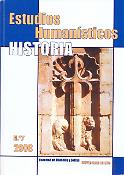Adivinación y presagios en el Bajo Imperio Romano según Amiano Marcelino
DOI:
https://doi.org/10.18002/ehh.v0i7.3107Keywords:
Historia Antigua, Bajo Imperio Romano, Marcelino, Amiano, Adivinación, Mentalidad pagana, Intervención divina, Divinaction, Presages, Later Roman Empire, Pagan Mentality, Divine intervention.Abstract
En el s. IV d. C. los romanos encontraron en sus convicciones religiosas motivos para creer en la adivinación. Uno de los rasgos de la mentalidad pagana consistía en ver en los hechos naturales una constante intervención divina y una consecuencia de los mensajes enviados a los hombres para estimular la ejecución de sus proyectos. Adivinación y presagios no sólo no experimentan una decadencia durante dicha e¡centurina sino que Amiano Marcelino parece buscar en sus Res Gestae justificación a tales prácticas.
ABSTRACT: In the 4th century A.D. the Romans found in their own religious convictions and in their own culture reasons to believe in the practices of the diviners. One of the main features in the pagan mentality is to be found in the natural events as the outcome of divine intervention and a consequence of the messages sent to men to stimulate the execution of projects. Divination and presages will not suffer a process of decay during the said century and Ammianus Marcellinus seems to be trying to find in his Res Gestae justification of the practices mentioned.
Downloads
References
AUSTIN, N.J.E. (1972). "Ammianus´Account of the Adrianople Campaign: Some Strategic Observations". AClass 15, 77ss.
BAYET, J. (1949). "La croyance romaine aux présages déterminants, aspect littérarire et chronologie". En Mélanges Bidez-Cumont. Bruselas: pp. 14ss., y BLOCH, R. (1956). "Les prodigies et la divination dans l´Italie ancienne". Diogène 16, pp. 62ss.
BEST,E. E. (1966). "The Literate Roman Soldier". CJ 72, pp. 122ss.
BROK,M. F. A. (1959). De perzische expeditie van Keizer Julianus volgens Ammianus Marcellinus, Groninga: p. 32.
CAMUS, P. M. (1967). Ammien Marcellin, témoin des courants culturels et religieux à la fin du IVe siècle. París.
DAVIES, J.P. (2004). Rome´s Religious History: Livy, Tacitus and Ammianus on their Gods, Londres: pp.161ss.
ENSSLIN, W. (1971). Zur Geschichtsschreibung und Weltsanchauung des Ammianus Marcellinus. Aalen: p.85.
FESTUGIÈRE, R. P. Antioche païenne et chrétienne, París 1959, pp.30-32.
JIMÉNEZ, J. (1961). "Importancia de los prodigios en Tito Livio". Helmantica 22, pp. 27ss., e Id. (1961). "Clasificación de los prodigios titolivianos". Helmantica 22, pp. 441ss.
KAJANTO, E. (1957). God and Fate in Livy. Kustantama.
LEOUTRE, G. (1962). Tite Live, instrument de la propagande païenne à la fin du IVe siècle et au début du Ve siècle. París.
MESLIN, M. (1972). Le merveilleux comme langage politique chez Ammien Marcellin. Bruselas : p. 354.
MEULDER, M. (1991). "Julien l´Apostat contre les Parthes: un guerrier impie". Byzantion 61, pp. 458ss.
RICHTER, U. (1989). "Die Funktion der Digressionen im Werk Ammians". WJA 15, pp. 209ss.
ROSEN, K. (1968). Studien zur Darstellungskunt und Glaubwürdigkeit des Ammianus Marcellinus. Mannheim : pp.164-165.
SAMBERGER,Ch. (1969). "Die "Kaiserbiographie" in den Res Gestae des Ammianus Marcellinus". Klio 51, 349ss.
SANTOS, N. (2007). "Fortuna y fatum: la contingencia en el desarrollo de la historia según Amiano Marcelino". Cuadernos de Filología Clásica. Estudios Latinos 27, pp. 93ss.
SANTOS, N. (2007). "Numen y deus en la concepción religiosa de Amiano Marcelino". Estudios humanísticos 6, 9ss.
STRAUB, J. (1952). "Das Ctesiphon-Orakel". En Studien zu Historia Augusta. Berna: p.132.
SYME, R. (1968). Ammianus and the Historia Augusta. Oxford: pp.31-32.
Downloads
Published
How to Cite
Issue
Section
License
Copyright (c) 2008 Narciso, 1949- Santos Yanguas

This work is licensed under a Creative Commons Attribution-NonCommercial-ShareAlike 4.0 International License.
Los autores que publican en esta revista están de acuerdo con los siguientes términos:
1.- Los autores ceden de forma no exclusiva los derechos de explotación (reproducción, distribución, comunicación pública, transformación) a la Universidad de León, por lo que pueden establecer, por separado, acuerdos adicionales para la distribución no exclusiva de la versión de la obra publicada en la revista (por ejemplo, alojarlo en un repositorio institucional o publicarlo en un libro), con un reconocimiento de su publicación inicial en esta revista.
2.- Este trabajo se encuentra bajo la Creative Commons Attribution-NonCommercial-ShareAlike 4.0 International License. Puede consultarse desde aquí la versión informativa y el texto legal de la licencia.
3.- Se permite y se anima a los autores a difundir electrónicamente las versiones pre-print (versión antes de ser evaluada) y/o post-print (versión evaluada y aceptada para su publicación) de sus obras antes de su publicación, ya que favorece su circulación y difusión más temprana y con ello un posible aumento en su citación y alcance entre la comunidad académica.








